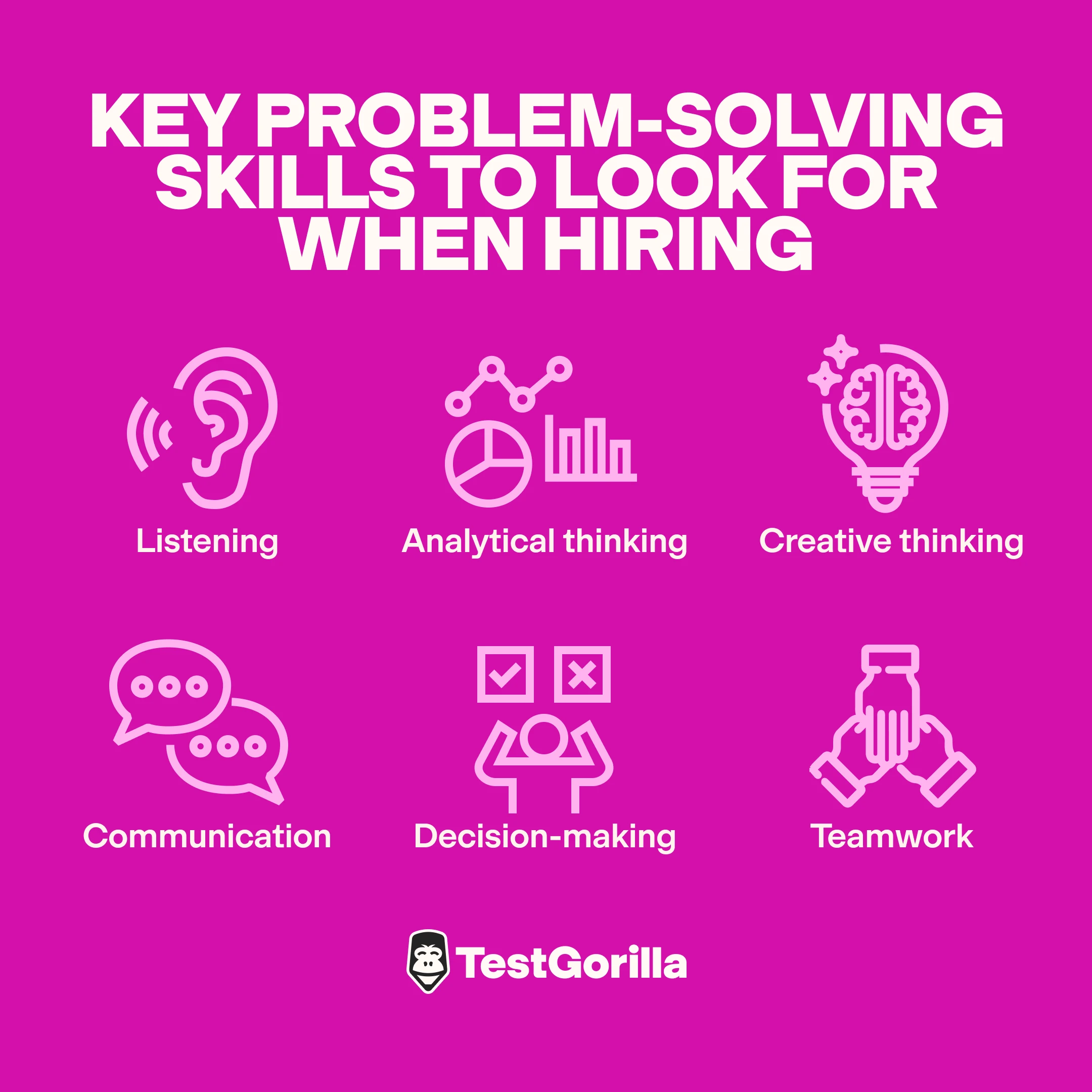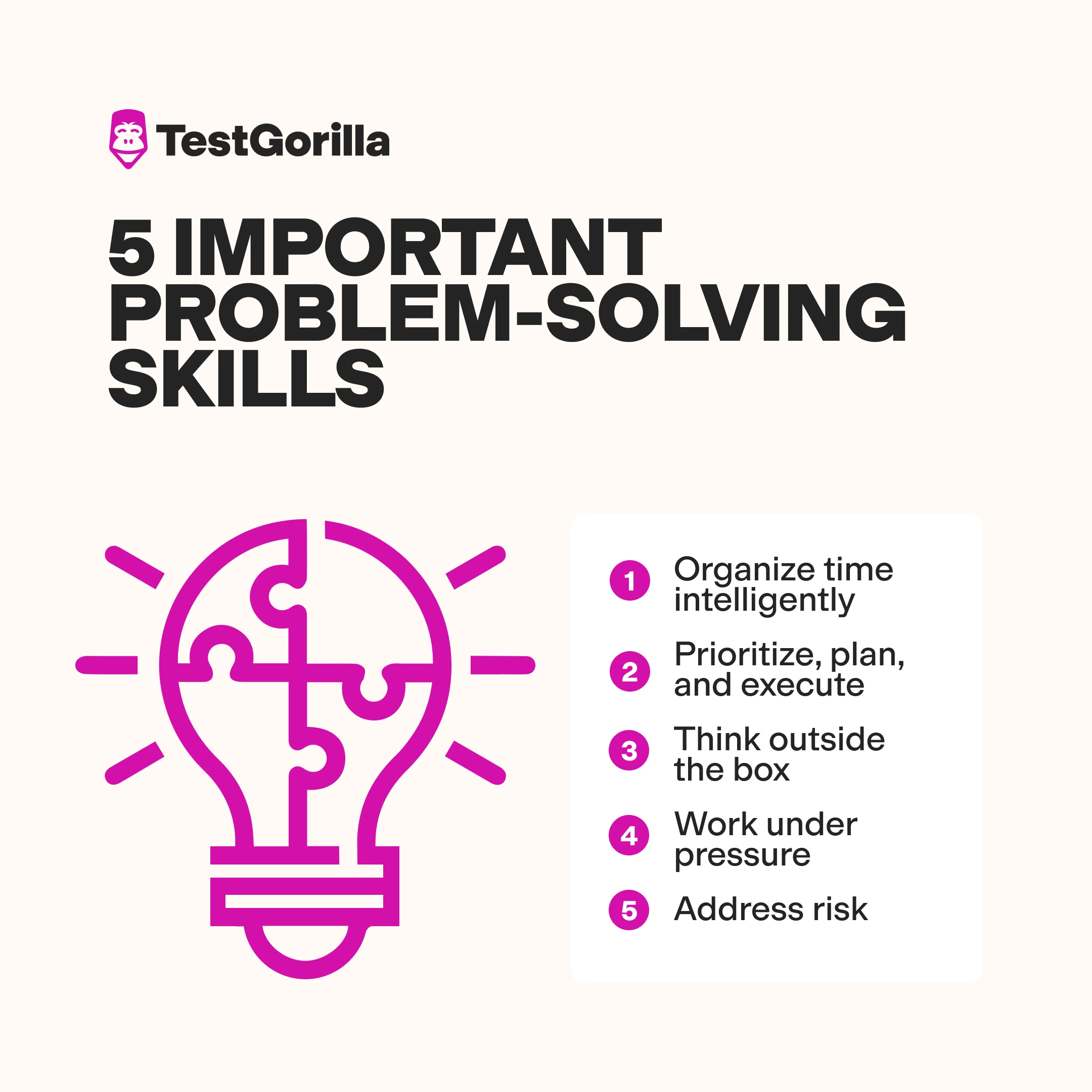Why are problem solving skills in the workplace so important? Subskills, benefits, scenarios
Test your candidates' problem-solving skills with TestGorilla
The importance of problem-solving skills in the workplace can’t be overstated. Every business and job role has its problems. From entry-level hires to senior staffers, every one of your employees will face challenges that don’t can’t be answered by doing a quick Google search – or asking ChatGPT to come up with solutions.
That’s why employers must hire people with excellent problem-solving skills, especially for roles that require dealing with complex business challenges, tight deadlines, and changing variables – for example, when recruiting leaders.
But what are problem-solving skills? What role do they play in the workplace?
And, most importantly, how can you evaluate candidates’ skills before you hire them?
Table of contents
- What are problem solving skills?
- The benefits of problem solving skills: Why are problem solving skills important?
- Examples of problems at the workplace – and how problem solving skills can help
- How to assess problem solving skills
- Evaluate problem solving skills and hire candidates who can think for themselves
What are problem solving skills?
To fully understand the importance of problem-solving skills in the workplace, it’s important first to understand the broad skill set that we commonly refer to as “problem solving skills”.
Generally, problem-solving refers to a person’s ability to successfully manage and find solutions for complex and unexpected situations.
Candidates with great problem-solving skills have a combination of analytical and creative thinking. They’re comfortable with making decisions and confident enough to rise to challenges in the workplace.
These candidates possess a combination of analytical, creative, and critical-thinking skills – and a high level of attention to detail. As a result, they will quickly identify problems when they arise and identify the most effective solutions.
They’ll also identify the factors and forces that might have caused the problem and instigate changes to mitigate future challenges.
There are six key problem-solving skills that you should look for when assessing job candidates:
1. Listening skills
Active listeners are generally great problem solvers.
They can listen to those around them to gather the information needed to solve the problem at hand. They also recognize the importance of valuing others’ opinions and experiences to help understand why the problem occurred and define the best course of action to remedy it.
2. Analytical thinking skills
Analytical thinkers can identify the logical reasons why a problem occurred, what the long-term effects of the issue could be, and identify how effective different solutions might be to select the most practical one.
That’s why it’s essential to assess analytical thinking skills during recruitment.
3. Creative thinking skills
Creative thinkers can balance their analytical skills with creative approaches to challenges. Creative thinking skills enable individuals to uncover innovative and progressive solutions to problems.
In this way, they’re able to provide new perspectives and provide imaginative and experimental solutions to all kinds of problems.
4. Communication skills
Problem solvers should also possess great communication skills. The ability to effectively relay complex information thoroughly yet succinctly is a huge benefit for employers working in fast-paced environments.
5. Decision-making skills
Those with problem-solving skills will also possess the ability to make decisions and be confident in them. This is important, because most problem-solving involves making firm decisions to reach a successful outcome.
6. Teamwork
Although problem-solvers need to be independent thinkers, it’s also vital for them to work well as part of a team.
Determining the best solution often requires collaboration, so it’s important that candidates can demonstrate how they can motivate others to come up with the best solutions and work with them to help develop and implement solutions.
The benefits of problem solving skills: Why are problem solving skills important?
Problem-solving skills enable you to find candidates who are cognitively equipped to handle anything their jobs throw at them.
Problem solvers can observe, judge, and act quickly when difficulties arise when they inevitably do. Moreover, they are not afraid of the unknown, which is invaluable to employers who rely on their employees to identify and solve problems.
There are several important benefits of problem-solving skills in the workplace. Below, we’ll go through five of the most significant ones that all problem solvers can bring to their roles and workplaces:
1. Ability to organize their time intelligently
Time management skills can often be underlooked as one of the benefits of problem-solving skills in the workplace.
However, those with problem-solving abilities also typically possess stellar time-management skills. The ability to manage their time wisely and laser-focus on what’s important to the business will lead to better decision-making and business impact.
2. Ability to prioritize, plan, and execute strategies
Problem solvers have no issue with carefully assessing customer and business needs and deciding how to prioritize, plan, and execute strategies to meet them. They can manage all moving parts and strategize to meet multiple unique demands.
3. Ability to think outside the box
Problem solvers can often identify hidden opportunities in problems. Thinking outside of the box is an important problem-solving skill in the workplace, because it can often lead to better outcomes than the originally expected ones.
4. Ability to work under pressure
This is often one of the most important benefits of problem-solving skills in the workplace. Problem solvers often work well under pressure, for example when dealing with short deadlines and changing project requirements.
Depending on your workplace culture, you might prefer someone who can deliver quick solutions or someone who takes their time to identify the next steps. Both are valid and important problem solving qualities.
5. Ability to address risk
Planning is an important problem-solving skill. Problem solvers are not just equipped to deal with the problem at hand but are also able to anticipate problems that will arise in the future based on trends, patterns, experience, and current events.
Examples of problems at the workplace – and how problem solving skills can help
Let’s now look at some specific examples of problems that could arise at the workplace – at any workplace, really – and how employees’ problem solving skills can help address each issue.
Below, you’ll find five typical scenarios where problem solving skills are essential.
Conflict between team members
Poor team dynamics or lack of a collaborative spirit might result in frequent workplace conflicts – especially within larger teams.
For example, members of cross-functional teams might disagree on the way they should address a particular issue or even on the priority they should give to it.
How problem solving skills can help:
Teamwork is essential when solving conflict – and a cornerstone of effective cross-functional team leadership.
For this, coworkers need to share a common understanding of the team’s goals and also be willing to work towards achieving them, even when they disagree on the specific approaches to each goal. The ability to understand others’ perspectives, analyze information critically, and come up with a few different solutions is key to finding a common ground and making progress on the team’s objectives.
Inefficient processes
Outdated, inefficient processes can reduce productivity and frustrate employees.
Multi-step approval processes are a typical example of this. Having multiple layers of approval for routine decisions can significantly slow down team progress and lead to missed opportunities.
How problem solving skills can help:
Analytical thinking skills are key in identifying inefficiencies and building better procedures. Employees or team leads can build flowcharts that speed up decision making without having to ask a supervisor’s permission at every step of the process.
Communication challengesLearn how pre-employment assessments can streamline your hiring process
Book a free live demo with us and learn how quick and easy it is to create an online skills assessment
Learn how pre-employment assessments can streamline your hiring process
Book a free live demo with us and learn how quick and easy it is to create an online skills assessment
Poor communication can lead to misunderstandings and lack of clarity and direction – which, in turn, can be detrimental to team performance.
For example, if you’re a remote-first company, maintaining clear and effective remote communication can be challenging.
The over-reliance on emails and messaging apps might make it feel like teams are communicating effectively and are always connected. However, the lack of non-verbal cues and face-to-face interactions might make it more difficult to build rapport and a positive workplace culture.
How problem solving skills can help:
Listening skills are essential to solving communication issues – and good listeners are often excellent at solving problems by recognizing, understanding, and acknowledging others’ points of view.
One-on-one meetings enable people to communicate more freely and effectively and solve challenges together, so consider encouraging team members to hop on a call each time they encounter a difficult challenge.
Additionally, you can help employees bond with each other with some remote team building activities to improve team cohesion. Plus, problem solving challenges can be excellent team building exercises.
Technological disruptions
New technologies often disrupt the usual ways of doing things – and sometimes, this can be disruptive for entire teams’ work.
For example, generative AI and automation technologies have revolutionized numerous types of work, including data analysis, marketing, customer service, and even content creation.
How problem solving skills can help:
Creative thinking and cognitive flexibility are among the top 10 most important skills of the future, according to the World Economic Forum. Both are essential for adopting new technologies successfully – and finding ways to make the most out of each new tool to improve productivity.
Insufficient onboarding resources
Team members may struggle to do their best work if they haven't received proper training or resources.
For example, start-ups that experience rapid growth might hire a few employees at once – or even entire teams.
If they fail to allocate sufficient time and resources to onboarding new hires, this might lead to lost productivity, a lacking sense of belonging, or increased turnover. That’s true not only for junior employees but also for newly hired senior leaders, as the Harvard Business Review points out.
How problem solving skills can help:
Your leadership team’s analytical and decision-making skills are crucial in enabling them to distribute limited resources in a way that would give their teams the best chances of success.
To build a solid onboarding process, you need leaders who are able to take ownership of it – and who have the right problem-solving skills.
How to assess problem solving skills
Many organizations use problem-solving interview questions to identify the right candidates for their job openings. However, the most effective way to assess problem-solving skills is with pre-employment skills assessments.
That’s because skills tests provide an objective way to quantify a candidate’s problem-solving skills in a way that isn’t possible during an interview.
How problem solving skills tests work
Tests like TestGorilla’s problem-solving skills test assist organizations in finding candidates who are able to quickly identify the key elements of the problem and work through the problem at speed without making mistakes.
By presenting candidates with a wide range of questions related to typical problem-solving scenarios, hiring teams can rank their candidates based on an intensive assessment of each candidate’s skill level.
The test specifically evaluates whether a candidate can perform problem-solving tasks like:
Creating and adjust schedules
Prioritizing items based on a given set of rules
Interpreting data and applying logic to make decisions
Analyzing textual and numerical information to draw conclusions
As you can see, even the best interviewer would have trouble assessing each of these skill areas while still covering all the other questions that they need to ask.
Evaluate problem solving skills and hire candidates who can think for themselves
If you’re convinced of the importance of problem-solving skills in the workplace and want to build a team of employees that can think independently and solve their own problems without constant supervision, assess problem-solving skills during the hiring process.
Problem-solving skills tests like ours are an excellent way to achieve this – especially if you combine them with other skills tests. Check out our extensive test library for other tests you can use in your talent assessment process to hire the best talent.
Sign up for our free plan to start building your first assessment – or schedule a demo with one of our experts to see how to evaluate applicants’ problem solving skills quickly, efficiently, and without bias.
Related posts
Hire the best candidates with TestGorilla
Create pre-employment assessments in minutes to screen candidates, save time, and hire the best talent.
Latest posts
The best advice in pre-employment testing, in your inbox.
No spam. Unsubscribe at any time.

Hire the best. No bias. No stress.
Our screening tests identify the best candidates and make your hiring decisions faster, easier, and bias-free.
Free resources
This checklist covers key features you should look for when choosing a skills testing platform
This resource will help you develop an onboarding checklist for new hires.
How to assess your candidates' attention to detail.
Learn how to get human resources certified through HRCI or SHRM.
Learn how you can improve the level of talent at your company.
Learn how CapitalT reduced hiring bias with online skills assessments.
Learn how to make the resume process more efficient and more effective.
Improve your hiring strategy with these 7 critical recruitment metrics.
Learn how Sukhi decreased time spent reviewing resumes by 83%!
Hire more efficiently with these hacks that 99% of recruiters aren't using.
Make a business case for diversity and inclusion initiatives with this data.






















